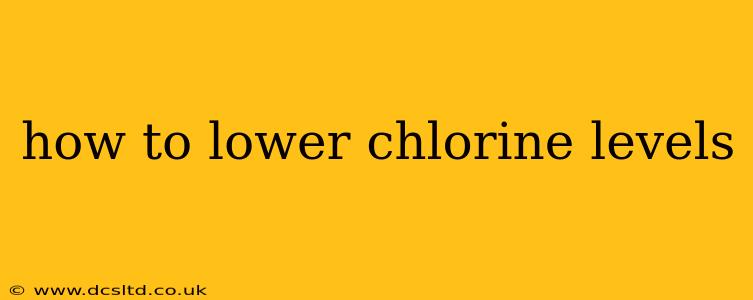Maintaining the proper chlorine levels in your swimming pool is crucial for safety and hygiene. Too much chlorine, however, can lead to irritated eyes, skin, and a harsh chemical smell. Knowing how to lower chlorine levels safely and effectively is essential for every pool owner. This guide will walk you through various methods, answering common questions along the way.
Why Are My Chlorine Levels Too High?
High chlorine levels often stem from over-treatment. This can happen due to accidentally adding too much chlorine, using a chlorine generator that's set too high, or infrequent testing and adjustments. Understanding the source of the problem is the first step to fixing it. Other factors, such as sunlight and high temperatures, can also accelerate chlorine depletion and lead to unexpectedly high levels if you're not vigilant with your testing and adjustments.
How to Lower Chlorine Levels: Effective Methods
Several methods can safely reduce high chlorine levels in your pool. The best approach depends on how high your levels are and the size of your pool.
1. Dilution: The Simplest Approach
For slightly elevated chlorine levels, simply adding more water can dilute the concentration. This is the easiest method but may not be practical for significantly high levels or smaller pools. Running your pool's filtration system for an extended period will also help to evenly distribute the chlorine.
2. Using a Chlorine Neutralizer: A Chemical Solution
Pool stores sell chlorine neutralizers, often sodium thiosulfate. This chemical reacts with chlorine, neutralizing it and reducing its concentration. Always follow the product instructions carefully, measuring the correct amount for your pool's size and existing chlorine level. This is generally a safer and more effective method than just adding water for higher chlorine levels.
3. Partial Water Drainage: A More Involved Approach
In cases of extremely high chlorine levels, partially draining and refilling your pool might be necessary. This is more labor-intensive and costly, involving draining a portion of the pool water and then refilling it with fresh water. Remember to consult your pool's manual before undertaking this measure.
4. Running the Filter System: A Passive Approach
While not directly lowering chlorine levels, running your filter system for extended periods will help to distribute the chlorine more evenly throughout the pool, reducing localized high concentrations. This is a helpful supplementary step to other methods.
How Long Does It Take to Lower Chlorine Levels?
The time it takes to lower chlorine levels varies based on the method used and the severity of the high chlorine levels. Dilution may take several hours to a day. Chemical neutralizers typically work within a few hours, while partial drainage and refilling take significantly longer.
What Happens if Chlorine Levels Are Too High?
Excessive chlorine can damage your pool's equipment, irritate swimmers' skin and eyes, and cause unpleasant odors. It can also fade pool surfaces and damage certain pool components.
How Often Should I Test My Pool's Chlorine Levels?
Regular testing is crucial for maintaining proper chlorine levels. Ideally, you should test your pool's water at least twice a week, or more frequently during hot weather or heavy use.
What are the ideal Chlorine levels?
The ideal chlorine level for most pools is between 1 and 3 parts per million (ppm). Always refer to your pool's specific instructions and recommendations.
Can I use household items to lower chlorine?
Avoid using household items to lower chlorine levels. Many household chemicals can react unpredictably with pool chemicals, potentially causing harm to both yourself and your pool. Always use pool-specific chemicals and follow the directions carefully.
By following these steps and regularly monitoring your pool's chlorine levels, you can ensure a safe and enjoyable swimming experience for everyone. Remember to always prioritize safety and consult your pool's manual or a pool professional if you're unsure about any aspect of pool maintenance.
